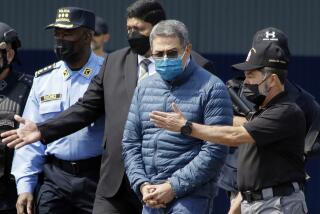A Kingpin Is Convicted--but Many Questions Remain : Can’t Washington pick its geopolitical friends a bit more carefully?
- Share via
No one will shed any tears for Gen. Manuel Noriega, the former military dictator of Panama who has been convicted of drug trafficking in a U.S. court and now faces a theoretical 120 years in prison. By almost any standard he is a brutish thug who did terrible things to his nation and contributed to the scourge of illicit drugs in this country. So good riddance.
But beyond the visceral satisfaction at justice being meted out to a truly bad man, it’s hard to feel very good about the Noriega verdict. That’s because one keeps remembering the sometimes bloody, and even sordid, ups and downs of the U.S. government’s campaign to get the Panamanian strongman; one keeps remembering not just the legal issues that are sure to be the basis of an appeal to a higher court--such as the secret recording of Noriega’s conversations with one of his attorneys--but the long history of the general’s covert relationship with the CIA and other U.S. government agencies, and the military intervention that was mounted to capture him.
THE VERDICT ON NORIEGA: After almost five months at trial, a Miami jury found Noriega guilty on eight (out of 10) counts of drug trafficking and racketeering. Prosecutors presented an impressive array of evidence, including the testimony of a jailed Colombian drug lord, that Noriega had taken millions in bribes from the Medellin crime cartel. In exchange he provided protection for cocaine shipments that passed through Panama on their way to the United States and safe haven for Colombian fugitives.
Only minimally aired at the trial was evidence that, in addition to his very profitable ties with the Colombian drug empire, Noriega was being paid to act as a contact for U.S. intelligence agencies and to cooperate with the Drug Enforcement Administration. This recipient of Washington’s largess had even collaborated with enemies of the United States such as Cuba’s Fidel Castro. Noriega’s activities formed a troubling, consistent pattern that should have prompted U.S. officials to have second thoughts about being so cozy with him long before they finally did. By the time they turned on their former collaborator with the full fury of the U.S. military, the stench of official hypocrisy extended from Panama City to Washington. And Thursday’s guilty verdict does little to dispel the awful smell, or to solve problems that remain.
Illegal drugs continue to be a daunting challenge for U.S. society, and for those foreign nations besieged by drug traffickers. Colombia did manage, at a terrible cost, to break the Medellin cartel, but now its place has been taken by a new, equally sophisticated drug ring based farther south, in Cali. And neighboring Peru is in the midst of a political crisis caused, at least in part, by corruption and violence that stem from the growth of drug trafficking there.
THE VERDICT ON THE U.S.: More than two years after Operation Just Cause “liberated” Panama, the country has a democratic government, but one that is barely functioning. Many homes and businesses destroyed in the invasion have yet to be rebuilt. Critics of the U.S. intervention still claim the toll in civilian fatalities caused by the invasion is much higher than the official count of 202. (U.S. forces lost 23 members, and 300 Panamanian soldiers were killed.) And Panama remains a transshipment point for illicit drugs bound for the United States . . . amid reports that even more drugs are getting through now than in Noriega’s heyday.
So it is hard to find vindication in this verdict for anyone involved, except perhaps the 23 Americans who lost their lives in the Panama invasion. Whatever the merits of that operation, they gave their last full measure trying to carry out their orders. For that they deserve our respect, admiration and prayers. But the political leaders who sent them on that mission, not to mention the shortsighted American officials who cooperated with Noriega when he was in power, must ask themselves if it was really worth it. Perhaps the best way it can be made so is if U.S. policy-makers remember the lessons of the Noriega regime and, in the future, pick our “friends” overseas a lot more carefully.
More to Read
Get the L.A. Times Politics newsletter
Deeply reported insights into legislation, politics and policy from Sacramento, Washington and beyond. In your inbox twice per week.
You may occasionally receive promotional content from the Los Angeles Times.








